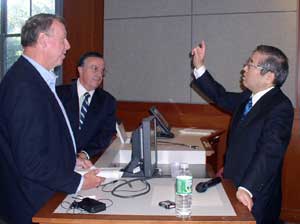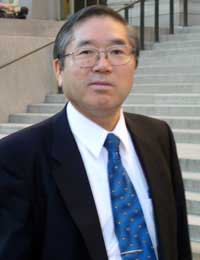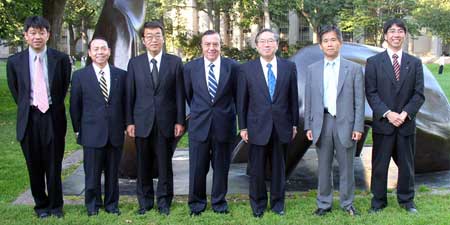 October 11, 2007 (Cambridge, Mass.) -- Massachusetts Institute of Technology and the Consulate General of Japan in Boston hosted a seminar on Advanced Materials presented by Professor Akihisa Inoue, President of Tohoku University of Japan. Prof. Inoue addressed an audience of MIT materials science students and faculty, as well as representatives from JEOL USA who assisted with the event, in an MIT lecture hall on Wednesday, September 19th.
October 11, 2007 (Cambridge, Mass.) -- Massachusetts Institute of Technology and the Consulate General of Japan in Boston hosted a seminar on Advanced Materials presented by Professor Akihisa Inoue, President of Tohoku University of Japan. Prof. Inoue addressed an audience of MIT materials science students and faculty, as well as representatives from JEOL USA who assisted with the event, in an MIT lecture hall on Wednesday, September 19th.
Marking the occasion of Tohoku University’s 100th anniversary and the university’s new initiatives in nanotechnology and materials science research, Professor Inoue is visiting key universities and research institutions around the world. Earlier in the week he was an invited speaker at the Materials Science & Technology (MS&T) conference in Detroit, Michigan, where he discussed “Characteristics and Applications of Fe-based Bulk Glassy Alloys.”
Consulate General Katsumi Machida gave opening remarks, noting that Professor Inoue had received many honors and awards in the field of materials science, and his research in a new class of bulk amorphous metals have a high impact on subsequent research around the world.
 JEOL USA President and CEO introduced Professor Inoue, stating that, “We clearly acknowledge the relationship that has existed between Tohoku University and JEOL and specifically with Professor Inoue and his colleagues in the field of material engineering. A certain vitality is created when industry and universities are brought together in partnerships. Technologies are enabled and science is applied, thereby providing numerous solutions.”
JEOL USA President and CEO introduced Professor Inoue, stating that, “We clearly acknowledge the relationship that has existed between Tohoku University and JEOL and specifically with Professor Inoue and his colleagues in the field of material engineering. A certain vitality is created when industry and universities are brought together in partnerships. Technologies are enabled and science is applied, thereby providing numerous solutions.”
Global nanorace to “deliver what we promise”
To preface his discussion of the new materials research program, Professor Inoue announced that the Japan Ministry of Education, Culture, Sports, Science and Technology offered a $30 million (US dollars) grant to develop World Premier International (WPI) Research Centers in Japan. Tohoku University was one of five universities awarded the funds.
With funding in place, the university will step up its emphasis on advanced research into the relatively new materials called bulk glassy alloys and their applications. The university’s new WPI Research Center for Atom – Molecule – Materials will pursue the creation of new compounds and materials with innovative functions, the construction of new devices, and the promotion of the research.
Global competition and collaboration with other universities and industry has further helped to define applications and bring these research products into production faster. “We feel pressure to deliver what we promise,” said Inuoe, explaining that there is a global “nanorace” in the field of nanotechnology between the U.S., Japan, Europe, and China.
Nanotechnology has made it possible to study and manipulate materials at the atomic, molecular, and macromolecular scale. Stronger materials lead to devices with smaller dimensions, such as advanced medical equipment, exponentially stronger gears with longer lifetimes, and miniscule devices such as antennas in cell phones. These are some of the commercial results of research at the university.
Pioneering research into stronger materials and miniaturization
Professor Inoue said that since its founding in 1907, the university has kept three major ideals: research, educating young scientists both male and female, and benefiting mankind. For nearly 30 years Professor Inoue conducted or led research at the university to advance materials science. Appointed President of the University in 2006, Professor Inoue is recognized as a true pioneer in new fields of research in metallic glass.
“We are very fortunate that we have accumulated a lot of information and have a large amount of experience,” he said. Tohoku University ranks third worldwide for having the most cited publications in the field of materials science.
Of the 500 or so nonferrous and ferrous alloy structures developed since the late 1980s, 50% were developed in the last 12 years, Inoue said. “This independent research field is still growing. These are unique glassy structures with a high degree of dense amorphous atomic packing in combination with conventional crystalline alloy structures.”
The resulting materials demonstrate extremely high tensile strength, higher performance and durability, and other unique properties that have been commercialized with great success in recent years. The glassy alloys also make it possible to produce the smallest of structures, such as the world’s smallest micro-geared motor.
Inoue’s work with supercooled metallic liquids opens a new scientific field that will benefit precision optics, microindustries, semiconductor, and biotech.

Collaboration and relationships benefit science
The research field started by Professor Inuoe has been facilitated by his associations with universities such as MIT and Harvard and others in Europe and Japan, and with industry, including two years with AT&T Bell Laboratories as a visiting researcher. Inuoe began his relationship with JEOL, a manufacturer of electron microscopes, when he selected scientific instrumentation for his labs some years ago. He and JEOL USA Chairman Shinichi Watanabe, who was his JEOL sales representative at the time, have maintained a long-term business relationship throughout their careers. Inoue also recalled visiting Boston over a decade ago to attend an early Materials Research Society (MRS) conference.
Inoue noted that now more than 20 companies are working with the glassy alloys to develop new products. “Always we must keep both our students and business informed and show the direction we are going,” he said.